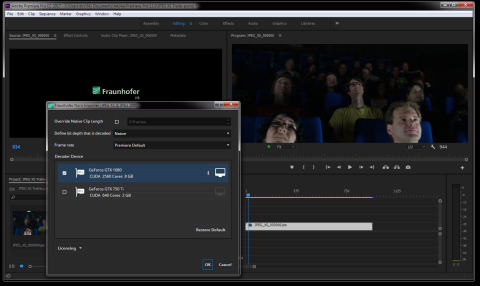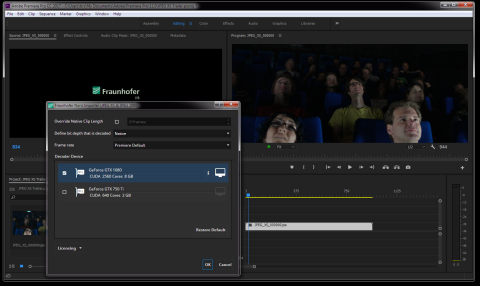ERLANGEN, Germany & LAS VEGAS--(BUSINESS WIRE)--The Fraunhofer Institute for Integrated Circuits IIS announces its first JPEG XS codec implementation for video production at the NAB Show in Las Vegas from April 9-12 2018. The coding specialists of Fraunhofer IIS will demonstrate the JPEG XS codec as an input format for post-production in a software plug-in for Adobe® Premiere® Pro CC with real-time playback capability of 4k60p UHD video.
With ever-increasing amounts of data from higher resolution and dynamic range in videos, long-distance transmission from coax cables in studios will soon become outdated. At the same time, production companies and studios are trying to substitute specialized cables and switches for video transmission by commercial off-the-shelf (COTS) components with the introduction of simple and cost-effective IP transmission over standard Ethernet infrastructures.
JPEG XS in general is a new codec under standardization by ISO/IEC SC29 WG1 (‘JPEG committee’) for IP workflows in studio environments, local video networks and VR/AR applications which allows transferring high-resolution video data over standard Ethernet or other wired connections. The codec is optimized for the use with mezzanine compression when high image quality data has to be transferred via limited bandwidth or has to be processed with limited computing resources. The Fraunhofer IIS JPEG XS development can be used for the lowest complexity and platform-independency applications at compression ratios from 2:1 to at least 6:1.
JPEG XS enables a simple integration in all existing hardware or software systems, such as cameras and extenders, due to its high granularity of parallelism in the algorithm. The codec is designed to take advantage of the SMPTE 2110 transmission layer system over IP.
At NAB Fraunhofer IIS will demonstrate the JPEG XS codec as an input format in a software-plugin for Adobe Premiere Pro CC for use in post-production with real-time playback capability of 4k60p UHD. The demonstrator runs on Windows and uses a NVIDIA graphic card to accelerate the decoding.
See our demonstration at NAB
Las Vegas Convention Center
South
Upper hall booth 4916
About Fraunhofer IIS
The Fraunhofer-Gesellschaft is the leading organization for applied
research in Europe. Its research activities are conducted by 69
institutes and research units at locations throughout Germany. The
Fraunhofer-Gesellschaft employs a staff of 24,500, who work with an
annual research budget totaling more than 2.1 billion euros.
The Fraunhofer
Institute for Integrated Circuits IIS is one of the world’s leading
application-oriented research institutions for microelectronic and IT
system solutions and services. It is the largest of all Fraunhofer
Institutes. Research at Fraunhofer IIS revolves around two guiding
topics:
In the area of “Audio and Media Technologies”, the
institute has been shaping the digitalization of media for more than 30
years now. Fraunhofer IIS was instrumental in the development of mp3 and
AAC and played a significant role in the digitalization of the cinema.
Current developments are opening up whole new sound worlds and are being
used in virtual reality, automotive sound systems, mobile telephony,
streaming and broadcasting.
In the context of “cognitive sensor
technologies”, the institute researches technologies for sensor
technology, data transmission technology, data analysis methods and the
exploitation of data as part of data-driven services and their
accompanying business models. This adds a cognitive component to the
function of the conventional “smart” sensor.
More than 900
employees conduct contract research for industry, the service sector and
public authorities. Founded in 1985 in Erlangen, Fraunhofer IIS has now
13 locations in 10 cities: Erlangen (headquarters), Nuremberg, Fürth,
Dresden, further in Bamberg, Waischenfeld, Coburg, Würzburg, Ilmenau and
Deggendorf. The budget of 150 million euros is mainly financed by
projects. 24 percent of the budget is subsidized by federal and state
funds.
Detailed information on: www.iis.fraunhofer.de/en




